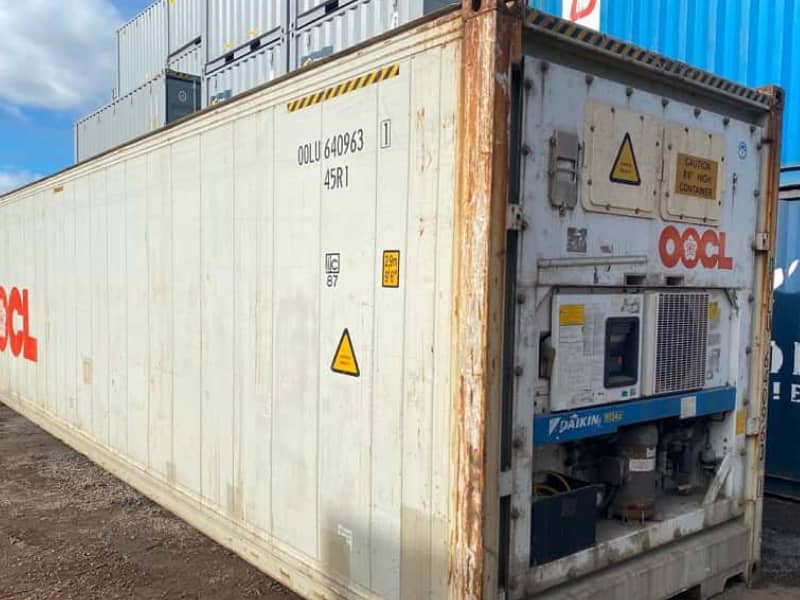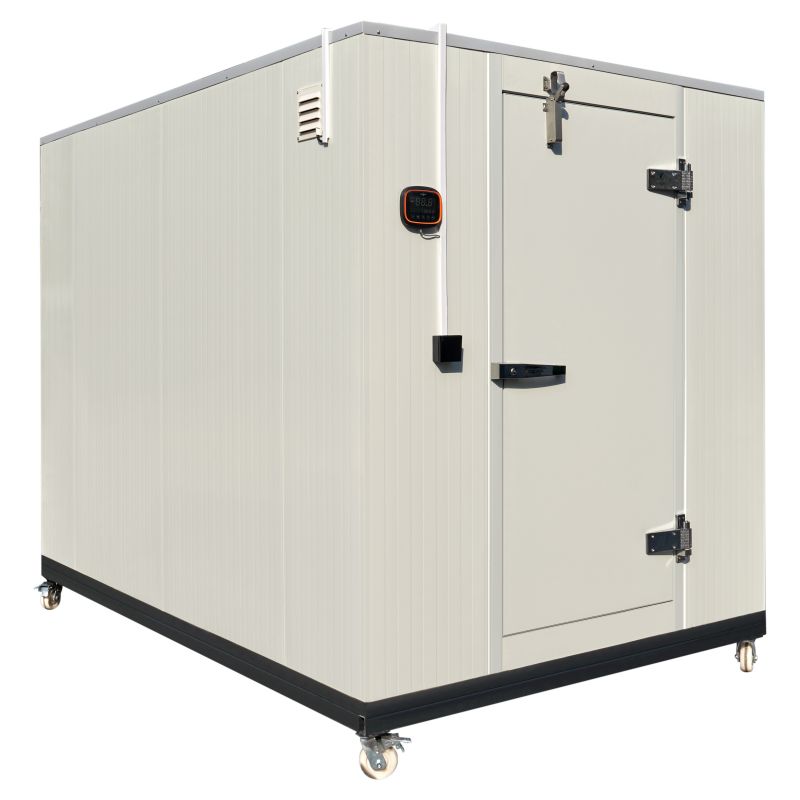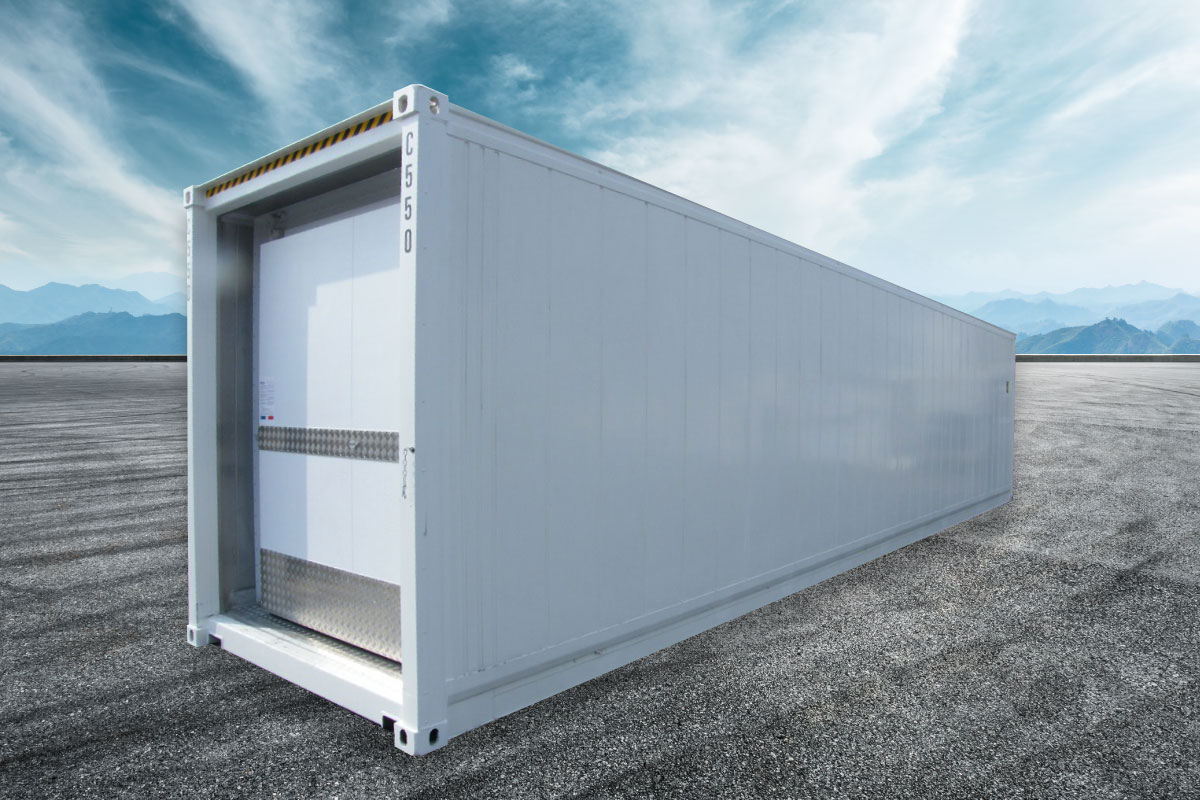All About Cold Store Containers: Vital Insights for Your Storage Space Demands
Freezer containers play an important role in the preservation of perishable items. They can be found in numerous forms, consisting of chilled and shielded devices, each designed for particular storage space demands. Comprehending the benefits and essential features of these containers is necessary for organizations intending to optimize their operations. As the need for reliable storage space services expands, discovering the different options readily available can cause notified choices that impact both profitability and sustainability. What aspects should one take into consideration when picking the appropriate container?
Kinds of Freezer Containers
Freezer containers can be found in different kinds, each designed to meet certain temperature control requirements. Amongst one of the most typical types are cooled containers, which preserve temperatures between 0 ° C to 10 ° C, making them suitable for perishable products like fruits, vegetables, and milk products. An additional type is the deep fridge freezer container, which runs at temperature levels listed below -18 ° C, ideal for long-term storage of frozen items such as meats and fish and shellfish.
Insulated containers give temperature level security without energetic air conditioning, making them useful for short-term transportation of temperature-sensitive products. Furthermore, there are portable cool storage devices, which supply adaptability in locations and are frequently made use of in events or seasonal procedures. Blast chillers quickly decrease the temperature level of warm foods, making certain security and high quality. Each type serves an one-of-a-kind function in different markets, from food service to pharmaceuticals, emphasizing the relevance of choosing the appropriate container for details storage space demands.

Advantages of Utilizing Cold Store Solutions

Additionally, cold store options extend the service life of things, lowering waste and enhancing earnings for organizations. By effectively handling inventory with correct temperature control, companies can maximize their supply chains and enhance operational efficiency.
Additionally, freezer facilities enable for versatile storage space choices, suiting various volume needs and seasonal changes popular (used 40ft refrigerated shipping containers). This versatility helps companies respond quickly to market changes
Finally, employing freezer solutions can guarantee compliance with wellness and safety and security laws, protecting both consumers and businesses. In general, the tactical use freezer boosts item administration while advertising sustainability and financial stability.
Trick Attributes to Search For in Freezer Containers
When selecting freezer containers, several vital features quality mindful factor to consider to protect peak efficiency and reliability. Temperature control capabilities are crucial; containers should maintain regular temperatures suitable for certain items. Insulation quality likewise plays a considerable role, as premium insulation minimizes energy consumption and improves temperature stability.
Next, simplicity of accessibility and loading is essential; containers should offer straightforward designs for reliable handling and company. Resilience is another essential facet; weather-resistant materials guarantee durability and protect components against ecological aspects.
Furthermore, wheelchair attributes, such as built-in wheels or lifting factors, promote transport, while adjustable designs enable for tailored storage services.
Keeping an eye on systems, consisting of temperature alarms and remote monitoring, give real-time updates, making particular that conditions remain excellent. By focusing on these functions, customers can choose cold storage containers that meet their functional needs efficiently.
Choosing the Right Cold Storage Space Container for Your Needs
Picking the ideal freezer container calls for a thoughtful evaluation of functional requirements and specific needs. Elements such as the type of items being stored, temperature level level of sensitivity, and volume must be focused on. For example, disposable food products may demand containers with stringent temperature level controls, while drugs may call for specific problems to maintain efficiency.
Additionally, potential users ought to think about the container's dimension and wheelchair. A bigger device may be required for mass storage, while smaller, mobile alternatives can be ideal for short-lived or on-site demands. Insulation high quality and energy effectiveness are likewise important, as these will influence operational prices and temperature security.
Conformity with sector regulations and standards is important, specifically in fields like food and health care. By carefully evaluating these facets, users can choose a cold store container that effectively meets their distinct requirements and guarantees optimal storage conditions.
Ideal Practices for Keeping Cold Storage Conditions
Maintaining optimal cold storage problems is essential for maintaining the quality and security of temperature-sensitive products. On a regular basis keeping track of temperature level and humidity degrees is important; using reliable electronic thermometers and hygrometers can offer precise analyses. Appropriate insulation of chilly storage space containers assists lessen temperature level fluctuations and power loss.
Applying a first-in, first-out (FIFO) system assures that older inventory is made use of prior to newer stock, lowering waste (used 40ft refrigerated shipping containers). Furthermore, keeping an organized design within the storage area enables better air flow and minimizes the danger of cross-contamination
Routine maintenance examine devices, such as seals and compressors, are necessary to stop breakdowns. Team training on ideal practices for filling and unloading items aids keep temperature stability. Finally, maintaining doors closed as much as feasible limits warm exchange, guaranteeing that the freezer environment continues to be steady and efficient in preserving beneficial products.
Price Factors To Consider for Cold Store Solutions
When assessing freezer options, it is vital to take into account the initial investment prices alongside ongoing functional expenses. An extensive failure of these prices can expose significant long-term cost savings potential for organizations. Comprehending these financial aspects helps stakeholders make informed choices concerning their cold store needs.

Preliminary Investment Expenses
The economic landscape of cold storage containers provides various first financial investment prices that businesses have to consider. These prices generally include the purchase or rental cost of the containers, which can differ based upon type, insulation, and size top quality. Additionally, expenses associated with retrofitting existing frameworks to accommodate cold storage should be factored in, particularly if specialized tools is required. Installment prices, including electric job and refrigeration systems, also add to the general initial investment. Companies should not overlook transportation expenses for delivering containers to their desired place. Ultimately, potential modification choices, such as shelving or temperature level surveillance systems, can further impact the first monetary outlay. Cautious budgeting for these variables is essential for effective chilly storage execution.
Functional Costs Breakdown
Functional expenditures for freezer solutions incorporate a number of important price considerations that services should navigate. Secret aspects consist of power expenses, which can be significant due to the requirement to preserve reduced temperatures. Upkeep expenditures are likewise substantial, as normal maintenance is necessary to ensure tools runs efficiently and continues to be compliant with health and safety and security standards. Additionally, labor costs might occur from the requirement for specialized staff to keep an eye on the storage and take care of atmosphere. Insurance coverage costs are an additional consideration, as firms must safeguard their investments versus potential losses. Lastly, any possible regulative compliance expenses have to be factored in, as businesses may need to buy systems that stick to food safety and environmental laws. Understanding these costs is important for reliable budgeting.
Long-Term Cost Savings Possible
Buying cold store services uses significant lasting financial savings capacity, transforming initial expenditures right into financial effectiveness over time. By decreasing putridity and waste, services can enhance their revenue margins considerably. Advanced insulation and energy-efficient systems minimize utility costs, which gather over the life expectancy of the devices. Furthermore, cold store containers frequently need much less constant maintenance contrasted to typical refrigeration methods, bring about reduced repair work expenditures. The capacity to store items for extensive periods without jeopardizing quality enables organizations to maximize market changes, maximizing revenue. Furthermore, the scalability of cold store options makes it possible for firms to adjust to changing needs without sustaining excessive costs. On the whole, these elements add to a compelling case for cold store as a cost-effective financial investment strategy.
Often Asked Concerns
The Length Of Time Can Food Be Kept in Freezer Containers?
The period food click here can be kept in cold storage space containers differs by type. Generally, perishable products last from days to weeks, while icy foods can stay safe for months, depending on appropriate temperature and storage space conditions.
Are Freezer Containers Energy-saving?
The power effectiveness of freezer containers differs based upon style and insulation high quality. Modern systems often make use of advanced innovation to lessen energy usage, eventually adding to reduced operational costs and environmental influence in long-lasting usage.
Can Cold Storage Containers Be Personalized for Particular Demands?
Freezer containers can undoubtedly be tailored to satisfy certain requirements. Adjustments might consist of temperature level controls, size adjustments, and extra functions, allowing individuals to tailor remedies efficiently for different storage needs and functional choices.
What Are the Usual Dimensions of Freezer Containers?
Freezer containers typically can be found in common dimensions such as 10, 20, and 40 feet. These dimensions accommodate various storage demands, guaranteeing flexibility for businesses requiring temperature-controlled settings for perishable goods or sensitive materials.
Do Cold Storage Space Containers Require Unique Licenses for Usage?
Freezer containers commonly require special licenses for use, depending upon local laws and planned applications. Authorities may mandate authorizations to guarantee security standards, ecological compliance, and appropriate functional practices are kept throughout their usage.
Cold storage space containers come in numerous types, each made to satisfy certain temperature control needs. Furthermore, cold storage space facilities permit for adaptable storage space choices, suiting various quantity demands and seasonal variations in need. Selecting the appropriate chilly storage container needs a thoughtful analysis of operational needs and certain requirements. The economic landscape of chilly storage space containers provides numerous preliminary financial investment prices that services must consider. Cold storage space containers can without a doubt be customized to satisfy details demands.